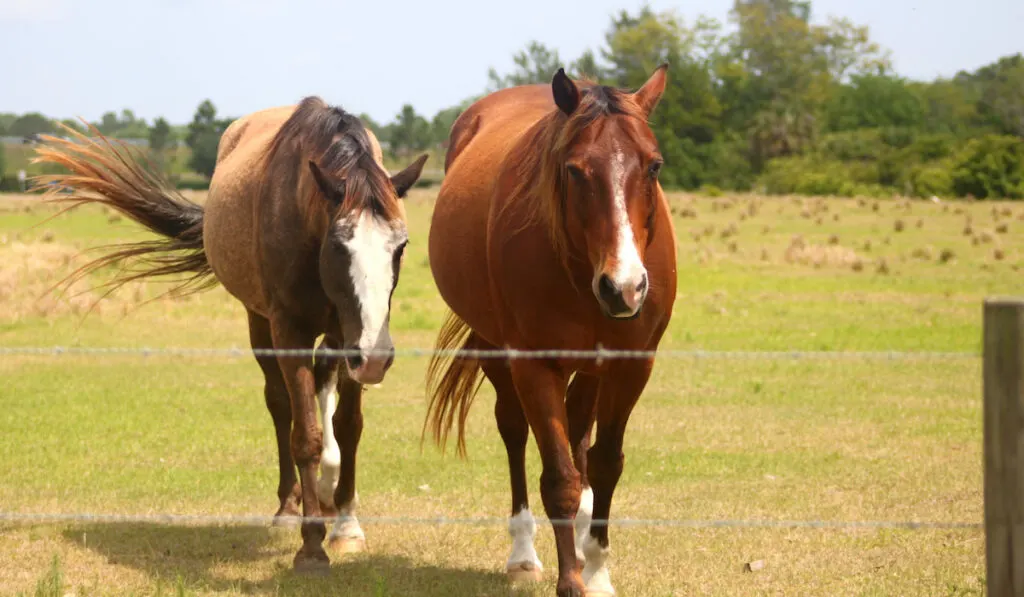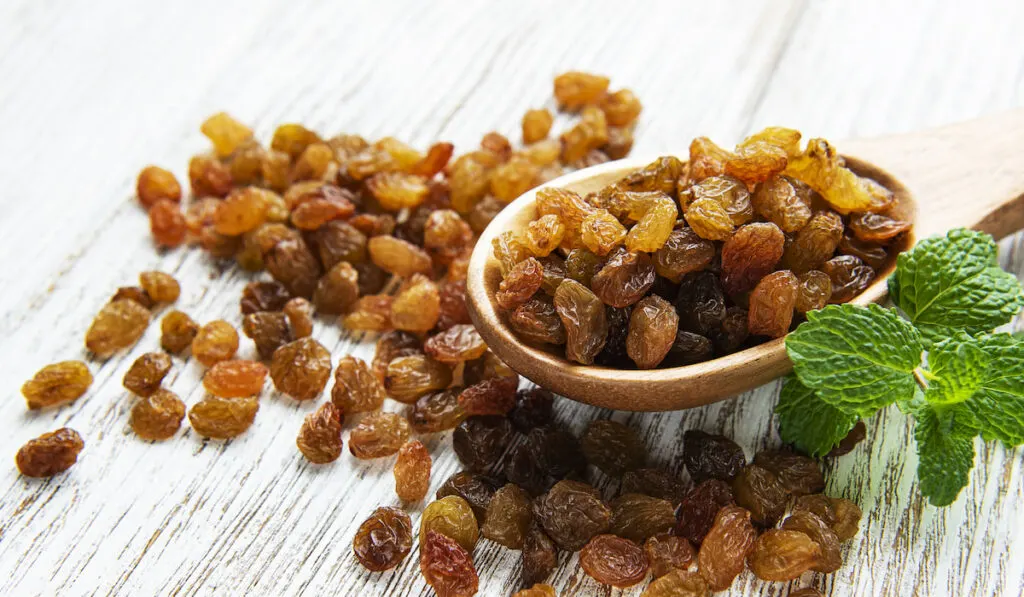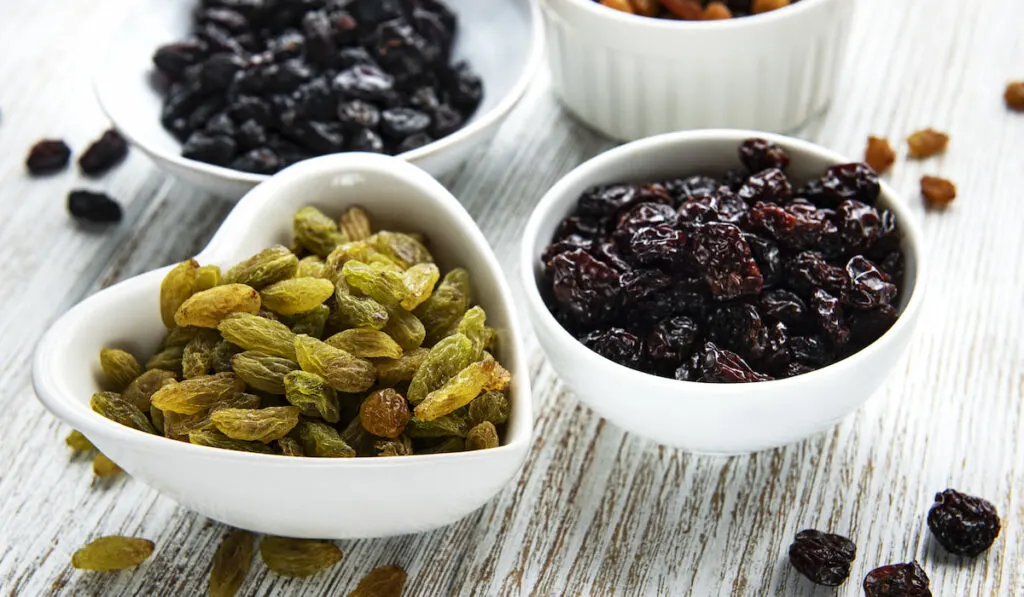If you enjoy munching on raising for a tasty snack, you might wonder if you can share them with your equine friends in the stable.
But like with any other treat, you should confirm whether it can be safely eaten by horses.
Can horses eat raisins?
Horses can safely eat raisins, and they actually enjoy the snack because they are sweet, chewy, and offer sufficient sugar. Raisins pose almost no choking hazard to horses, and they are safe in moderate amounts. Excessive amounts of raisins may lead to digestive problems or discomfort in horses.
Since you now know horses can eat raisins, let’s review the types of raisins they can eat and what they stand to gain from eating raisins.

Table of Contents
Can Horses Eat Raisins?
Horses can eat raisins, be it raisins from green grapes or from red grapes.
As with many other types of horse foods and treats, you should only give your horses moderate amounts of raisins. Too much of it may upset their stomach and cause digestive problems.
The digestive tract of a horse is quite sensitive. The balance between the microbes in a horse’s gut is delicate.
Too many raisins can easily disturb this balance and lead to digestive problems such as colic.
The chances of horses choking from raisins are slim, but it can still happen if they try to swallow large gulps at once. To further reduce the risk, give them their raisin treats in multiple small portions.
Sugar Covered Raisins
Raisins already contain a lot of sugar, and covering them with sugar only raises the sugar content.
While horses might be able to eat sugar-covered raisins, it is not the best option.
Too much sugar can make horses unhealthy or even obese.
Raisin Bran
Raisin bran is a combination of raisins and bran flakes. Bran flakes can either be oat flakes or wheat flakes.
Horses can eat raisin bran but only in moderate amounts.
It should not make up more than 10% of the horse’s diet.
Bran contains disproportionate amounts of calcium and phytate, a form of phosphorus. There are high levels of phytate and low levels of calcium in bran.
Phytate hinders the absorption of minerals like calcium, manganese, zinc, and copper.
This causes mineral imbalances that could have various adverse effects on the health of a horse, particularly bone health.
In moderate amounts, the effect of phytate from raisin bran would be relatively insignificant. But give the horses too much raisin bran, and there would be consequences.
Aside from the adverse effects of phytate, raisin bran offers horses a good source of dietary fiber.
The fiber in raisin bran can contribute to the healthiness of the digestive system.
Raisin Bread
Horses can eat raisin bread as long as it is given in moderation.
If your horse competes in events where it could be tested for drugs, you should not give it raisin bread containing chocolate.
If you do, the horse may get a positive result from the drug test.
Raisin Cookies
Horses can eat raisin cookies.
But as with other treats, they should only eat it moderately, and it should not make up more than 10% of their diet.
If your horse is equestrian or participates in competitions, do not give it chocolate raisin cookies or it may fail a randomized drug test.

Nutritional Benefits of Raisins
Besides being chewy and tasty, raisins offer horses some nutrition benefits.
Raisins contain significant amounts of potassium, iron, magnesium, calcium, vitamin B6, and vitamin C.
Potassium
Potassium is essential for electrolyte balance in horses. Potassium facilitates the contraction and relaxation of muscles alongside calcium and sodium. It also promotes cellular buoyancy.
Iron
Iron is required by the horse’s body to create heme. Heme is a part of hemoglobin, the protein that gives blood its red color and carries oxygen.
Magnesium
Magnesium helps improve muscle strength, muscle relaxation, and endurance.
It also promotes the function of enzymes important in digestion and metabolism.
Additionally, magnesium contributes to nerve functions as it regulates the ion balance across nerve cells.
Maintaining an optimal level of magnesium can also help horses resist the adverse effects of stress and tolerate it better. It also helps prevent cases of laminitis.
Calcium
Calcium maintains the integrity of a horse’s bone structure. It also promotes bone formation and muscle function, and it is essential for blood clotting.
Vitamin B6
Vitamin B6 helps the development of a horse’s nervous system and promotes energy metabolism.
Vitamin C
Vitamin C can be useful to horses in times of stress. It also promotes immunity and can help the horses fight infection better.

Are Raisins Toxic to Horses?
Raisins are not toxic to horses when given in moderation. In large amounts, raisins will alter the microbial flora of a horse’s gut, and this will lead to various digestive problems.
How Many Raisins Are Safe for Horses to Eat?
There is no standard for the maximum amount of raisins safe for horses. However, you should limit the amount of treats they get to less than 10% of their diet.
You may also speak with a veterinarian to verify how many raisins are safe for your horses to eat.
Horse Treat Ideas With Raisins
If you want to spice up the raisin treat your horses get, here are some ideas you can try out.
Raisin-Carrot-Apple Mix
Ingredients
- ½ cup raisins
- 1 cup chopped carrots
- ½ cup diced apples
- 1 tbsp. brown sugar
- ¼ tsp. cooking salt
- ¼ cup water
- ½ tbsp. olive oil
Directions
- Add the olive oil to a large skillet and place over medium heat for 1-2 minutes.
- When the oil is hot, add the raisins, carrot, and apple, and then cook for 3 minutes.
- Add brown sugar, salt, and water to the skillet and stir thoroughly for 90 seconds.
- Remove the mixture from heat, allow it to become lukewarm, and then serve the horses.
Raisin Salad
Ingredients
- 1 cup chopped carrots
- ¾ cup apple slices
- 1 cup raisins
- ½ tbsp. olive oil
- 2 tbsp. brown sugar
Directions
- Add the carrots, raisins, and apples to a bowl, and then stir thoroughly.
- Dredge the brown sugar over the mixture and stir thoroughly.
- Dredge in the olive oil and stir again.
- You may serve immediately or refrigerate for 5-10 minutes.
Summary
Horses can eat raisins, but as with many other treats, the amount of raisins horses get should be in moderation.
Giving them too much might disturb the integrity of their gut and leave them at risk of digestive issues.
Resources
- https://ker.com/equinews/feeding-treats-horses/
- https://www.primestables.co.uk/blog/what-can-horses-eat-the-top-20-foods-you-didnt-know-horses-could-eat/
- https://thehorse.com/130604/safety-and-horse-snacks/
- https://pets.stackexchange.com/questions/15423/can-horse-eat-sultanas-in-sultana-bread
- https://fdc.nal.usda.gov/
- https://ker.com/equinews/potassium-imbalance-hyperkalemia-horses/
- https://www.spillers-feeds.com/iron-for-horses/
- https://madbarn.com/magnesium-benefits-for-horses/
- https://hygain.com.au/blogs/library/mineral-nutrition-importance-calcium-phosphorus
- https://forageplustalk.co.uk/b-vitamins-for-horses/
- https://www.plusvital.com/vitamin-c-horse
